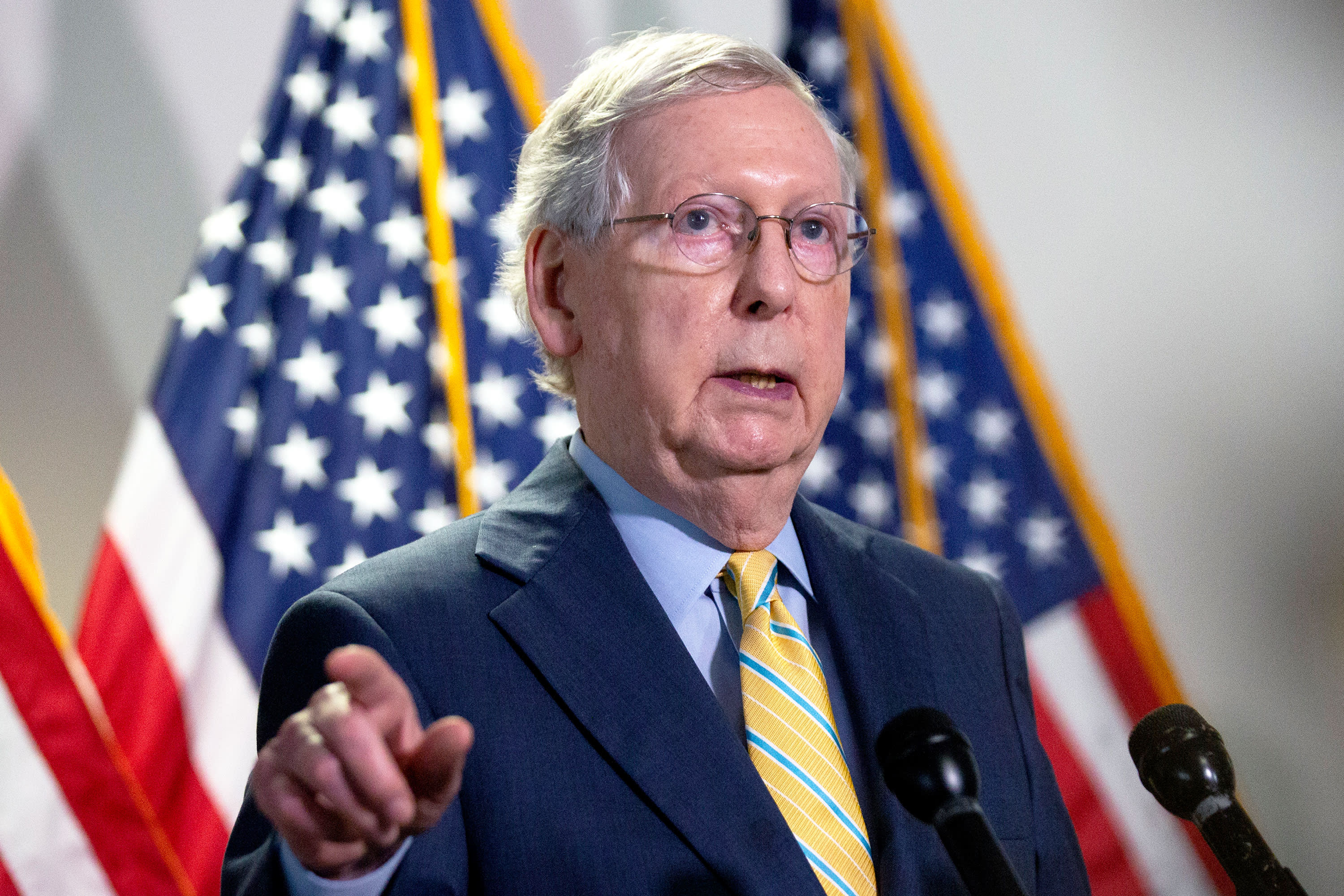
Senate Majority Leader Mitch McConnell unveiled the Republican coronavirus relief plan on Monday.
Here is what we know about the bill, as Republican leaders release the details:
- It would set enhanced federal unemployment insurance at 70% of a worker's previous wages, replacing the $600 per week which states stopped paying out this week.
- The GOP would set the benefit at a sum of $200 per week on top of what recipients would normally receive from states through September, slashing what they got from April through July. In October, the 70% replacement would take effect up to a maximum of $500 per week.
- The proposal would send direct payments of $1,200 and $2,400 to individuals and couples, respectively. It would set the same qualifications as the checks approved in March: the payments started to phase out at an average of $75,000 in income per person, and individuals or couples making an average of $99,000 or more did not receive one. It would offer an additional $500 per dependent of any age.
- The legislation would shield entities such as businesses, doctors and schools from lawsuits, except for cases of "gross negligence" or "willful misconduct."
- It would set aside $190 billion for Paycheck Protection Program loans. The bill would allow small businesses with fewer than 300 employees that have seen revenue fall by more than 50% to apply for a second round of aid. It would also authorize $100 billion for loans to seasonal businesses and companies in low-income Census tracts that can show revenue reduction of more than 50%.
- The bill provides $105 billion to help schools reopen in the fall. Roughly $30 billion of that amount would go to colleges, according to Senate Health, Education, Labor, and Pensions Chairman Lamar Alexander, R-Tenn. Most of the money would go to schools physically reopening to help them with the costs associated with safely restarting.
- It includes $16 billion to help states boost Covid-19 testing capacity, according to Senate Appropriations Committee Chairman Richard Shelby, R-Ala.
- Shelby said it would put $26 billion toward the development of Covid-19 vaccines and therapeutics.
- The plan includes 100% deductability of business meals, according to Sen. Tim Scott, R-S.C.
- It includes several tax credits, including an enhanced employee retention credit and a credit for expenses such as upgrades to workplaces and testing that help businesses operate safely.
McConnell, of Kentucky, and his fellow Republicans unveiled the measure as Congress scrambles to respond to a pandemic still wreaking havoc across the country. GOP committee chairs outlined major parts of the legislation they hope will serve as a starting point in talks with Democrats on a bill that could pass both chambers of Congress.
House Speaker Nancy Pelosi, D-Calif., and Senate Minority Leader Chuck Schumer, D-N.Y., planned to meet with Treasury Secretary Steven Mnuchin and White House chief of staff Mark Meadows at 6 p.m. ET. In a statement earlier Monday, the speaker called to start negotiations following release of the GOP plan.
"If Republicans care about working families, this won't take long. Time is running out. Congress cannot go home without an agreement," Pelosi said, referencing lawmakers' planned August recess.
McConnell, in outlining the plan Monday, urged Democrats to come to an agreement quickly.
"The pandemic is not finished. The economic pain is not finished. So Congress cannot be finished either," he said.
The GOP hoped to release a pandemic aid plan last week, but senators and the White House struggled to reach a consensus as Covid-19 cases and deaths rise around the country. Democrats, who passed a $3 trillion relief plan in May, will look to change many provisions in the Republican opening offer.
For now, the roughly 30 million people still receiving some form of unemployment insurance wait to see how quickly Congress will extend assistance — and whether it slashes benefits when it does. Speaking after McConnell unveiled the plan, Schumer said the reported Republican jobless benefit proposal would hurt unemployed Americans, draw money out of the economy and prove daunting for states to implement.
"The Republican proposal on unemployment benefits, simply put, is unworkable," he said.
Senate Finance Committee ranking member Sen. Ron Wyden, D-Ore., called the proposal a "punch in the gut and a slap in the face for the 30 million Americans relying on lifeline unemployment benefits."
Republicans and Democrats are at odds over how best to lift an American economy and health-care system damaged by an outbreak the U.S. has failed to contain. As of Monday afternoon, the U.S. had reported more than 4.2 million Covid-19 cases and roughly 147,000 deaths from the disease, according to data compiled by Johns Hopkins University.
The U.S. had an unemployment rate above 11% in June even after two strong months of job gains driven by states reopening their economies. But many states have had to pause or roll back their restart plans in response to coronavirus case spikes.
Congress has already approved more than $2.5 trillion in spending this year to combat the health and economic crises.
— CNBC's Tucker Higgins contributed to this report
"news" - Google News
July 28, 2020 at 03:40AM
https://ift.tt/2WZ3IOU
Senate GOP unveils coronavirus relief plan with 70% wage replacement in unemployment insurance - CNBC
"news" - Google News
https://ift.tt/2DACPId
https://ift.tt/2Wh3f9n
Bagikan Berita Ini














0 Response to "Senate GOP unveils coronavirus relief plan with 70% wage replacement in unemployment insurance - CNBC"
Post a Comment